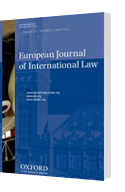Several of the major faculty-edited peer review journals in international law and global public law were or are currently led by full-time NYU Law School professors. Among these are the American Journal of International Law (AJIL, edited by José E. Alvarez and Benedict Kingsbury until spring 2018), the European Journal of International Law (EJIL, edited by Joseph Weiler), and the International Journal of Constitutional Law (ICON, edited by Grainne de Burca and Joseph Weiler). This seminar provided a unique opportunity for students to work closely with some faculty in assessing and debating the most promising incoming manuscripts, and in rethinking the role of such journals in the era of massive information and a deluge of online papers. This innovative seminar examined issues in current international legal scholarship in relation to a diverse selection of individual journal manuscripts and students’ own scholarship. Issues include: topic selection, research questions, methodology suited to answering these questions, compilation of data and source material, formulation of an argument, articulation of relations to prior literature, structure of a successful paper, voice and writing style, ethical issues in research (including IRB requirements and funding disclosures or conditions), and good practices in making underlying data available to others.
We also considered the roles of journals in relation to scholarship: the functions and challenges of serious peer review, mentoring or support of scholarship in “revise and resubmit” and in reasoned rejection letters, helping give leadership in fields and actively promoting new directions in topics and methods of scholarship, active promotion of diversity of viewpoint and voice, cross-disciplinary issues, promotion of contestation and multiplicity of perspective, tensions between durability or fundamental contribution and contemporary salience, and integration across multiple formats. Special attention is given to issues of viewpoint, scholarly style, relations of theory and practice, conflicts of interest, and uneven coverage and expertise arising from the international legal subject matter, connections with practice and politics, and intended global engagements of contributors and authors in these particular journals. Student assessment papers and original papers will all relate to the work of the journals (manuscripts, or broad policy issues) – this seminar is not a suitable vehicle for student scholarship not tightly related to these. Seminar materials will primarily be manuscripts, carefully selected by the professors, that are under consideration by (or accepted by) one of the journals. Periodically we will discuss reports or literature concerning roles of journals or issues arising within journals, including large-n or multi-year analysis of published work, metrics such as impact assessment, and evaluations of new formats and possible innovations. Students will be required to respect confidentiality of materials not in the public domain.
The seminar included students currently or prospectively working with one of the relevant journals, but was open to all JD, LLM and JSD students with serious scholarly interests in international law and global public law (including students interested in academic careers).




